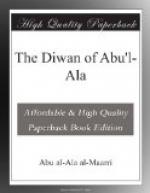An ambitious man desired, regardless of expense, to hand down his name to posterity (quatrain 99). “Write your name in a prayer,” said Epictetus, “and it will remain after you.” “But I would have a crown of gold,” was the reply. “If you have quite made up your mind to have a crown,” said Epictetus, “take a crown of roses, for it is more beautiful.” In the words of Heredia:
Deja le Temps brandit l’arme fatale.
As-tu
L’espoir d’eterniser le bruit
de ta vertu?
Un vil lierre suffit a disjoindre un trophee;
Et seul, aux blocs epars des marbres triomphaux
Ou ta gloire en ruine est par l’herbe
etouffee,
Quelque faucheur Samnite ebrechera sa
faulx.
Would we write our names so that they endure for ever? There was in certain Arab circles a heresy which held that the letters of the alphabet (quatrain 101) are metamorphoses of men. And Magaira, who founded a sect, maintained that the letters of the alphabet are like limbs of God. According to him, when God wished to create the world, He wrote with His own hands the deeds of men, both the good and the bad; but, at sight of the sins which men were going to commit, He entered into such a fury that He sweated, and from His sweat two seas were formed, the one of salt water and the other of sweet water. From the first one the infidels were formed, and from the second the Shi’ites. But to this view of the everlasting question you may possibly prefer what is advanced (quatrains 103-7) and paraphrased as an episode: Whatever be the wisdom of the worms, we bow before the silence of the rose. As for Abu’l-Ala, we leave him now prostrated (quatrain 108) before the silence of the rolling world. It is a splendour that was seen by Alfred de Vigny:
Je roule avec dedain, sans voir et sans
entendre,
A cote des fourmis les populations;
Je ne distingue pas leur terrier de leur
cendre.
J’ignore en les portant les noms
des nations.
On me dit une mere et je suis une tombe.
Mon hiver prend vos morts comme son hecatombe,
Mon printemps n’entend pas vos adorations.




